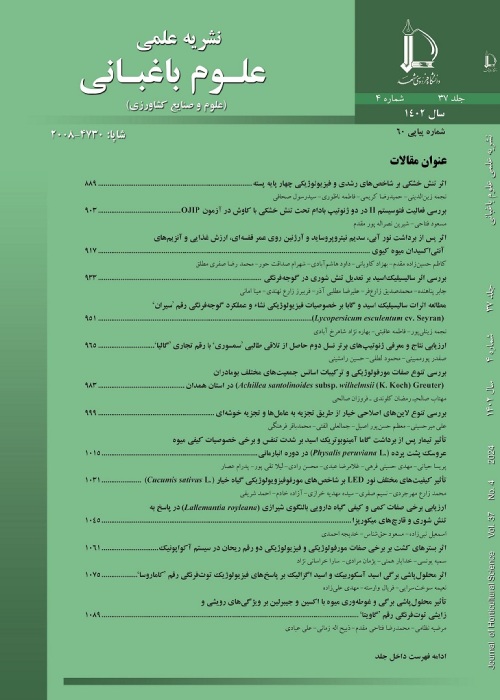Postharvest Application of Spermidine Polyamine on the Storage Quality and Vase Life of Mango (Mangifera indica L.) in Dipped Conditions
Author(s):
Article Type:
Research/Original Article (دارای رتبه معتبر)
Abstract:
Introduction
Mango (Mangifera indica) is a tropical fruit native to India whose global production in 2014 reached nearly 45 million tones. Mango is a commercially important fruit and improvement in its storage is of special importance. Mango is a Climacteric fruit whose ripening is done by exogenous or endogenous ethylene. In plants, Polyamines such as spermine, spermidine, and putrescine contradict ethylene because of a common precursor (s-adenosyl methionine (SAM). During ripening, different qualitative and nutritional changes occur in the fruit, e. g. changes in color, tissue softening, accumulation of sugars and organic acids, and great changes in taste, flavor, aroma and plant biochemical materials. Fruit ripening is a complicated process, complementary to fruit development, and a start to its senescence. In general, senescence of a fruit is related to loss of membrane lipids, destabilization of membrane matrix, and lipid peroxidation. Recently, naturally active biological products are applied in a large amount for increasing the storage life and quality of the fruits and delaying their senescence.This study was carried out to investigate the effect of different concentrations of spermidine on the quality and vase life of a local mango variety of Minab.Materials And Methods
Healthy fruits, uniform in size, shape, color, and degree of maturity were selected from a mango orchard in Minab and their original physical and chemical characteristics on the first day were measured after washing with water and drying. Statistical analysis of data was done by a general linear model (GLM) with SAS (version 9.1) and mean comparisons were performed using Duncan's multiple range test. Treatment solution in the rate of 0, 0.5, 1, and 2 mM spermidine (SIGMA) was made and its pH was set to 5 using NaOH. One liter of distilled water was used in the control treatment. The treated samples were immersed in solutions of different concentrations of spermidine just once for 30 minutes. During 24-days of shelf life, storage temperature was 15 °C and the relative humidity was 85 to 90 percent. Measurements were on the zero, 8th, 16th, and 24th days. Characteristics such as weight, firmness, flavor index, phenol, ascorbic acid, qualitative characteristics (PH, TA and TSS), and sensory evaluation were measured.Results And Discussion
The results showed that physical and biochemical qualities in the control fruit were lower compared to the other treatments. The Polyamine treatment with spermidine, especially at the concentration of 2 mM, significantly maintained weight loss and reduction of vitamin C during storage of fruits. Spermidine treatments increased ascorbic acid and other organic acids in fruit juice and reduced pH. Increased acidity in spermidine treatments of these substances play an active role in coping with storage stress. Moreover, with reduction of tissue respiration, the consumption of organic acids decreased during storage. The results showed that increasing the concentration of spermidine leads to the least decrease in the phenol flesh. Firmness gradually decreased during storage and at the end of shelf life, there was significant difference between the treatments. It was found that treatments with 1 and 2 mM spermidine were the best. Furthermore, the effect of spermidine on the total soluble solid solutions in the flesh of mango fruit was not significant during storage. But skin color, taste, flavor, and aroma index were more favorable. Treatments that delay production of structural lipids led to the production of aromatic volatile substances, which produced a favorable aroma in fruits. It seems that increasing spermidine concentration plays an important role in mango fruit fragrance at the end of shelf-life. The 2 mM spermidine treatment led to the highest total content of phenol and showed the lowest pH in fruit juice.Conclusions
Spermidine, that is naturally present in animals and plants in particular, belongs to the amine groups. The results indicated that spermidine maintains firmness and extends shelf life of mango fruits and has a significant and beneficial impact on the quality characteristics including weight, color, taste, aroma, and vitamin C during storage. It seems that spermidine of 2 mM concentration has tangible impact on mango fruits and it is recommended in mango store rooms. There is a competition in production of Ethylene and polyamides of spermine, spermidine, and putrescine in plants, due to their common precursor namely S-adenosyl methionine, yet they act oppositely in ripening and senescence processes. Application of polyamides had extraordinary effects on the quality of some fruits during storage.Keywords:
Dipped , Mango , Phenol , Spermidine , Storage
Language:
Persian
Published:
Journal of horticulture science, Volume:31 Issue: 4, 2018
Pages:
765 to 777
magiran.com/p1810209
دانلود و مطالعه متن این مقاله با یکی از روشهای زیر امکان پذیر است:
اشتراک شخصی
با عضویت و پرداخت آنلاین حق اشتراک یکساله به مبلغ 1,390,000ريال میتوانید 70 عنوان مطلب دانلود کنید!
اشتراک سازمانی
به کتابخانه دانشگاه یا محل کار خود پیشنهاد کنید تا اشتراک سازمانی این پایگاه را برای دسترسی نامحدود همه کاربران به متن مطالب تهیه نمایند!
توجه!
- حق عضویت دریافتی صرف حمایت از نشریات عضو و نگهداری، تکمیل و توسعه مگیران میشود.
- پرداخت حق اشتراک و دانلود مقالات اجازه بازنشر آن در سایر رسانههای چاپی و دیجیتال را به کاربر نمیدهد.
In order to view content subscription is required
Personal subscription
Subscribe magiran.com for 70 € euros via PayPal and download 70 articles during a year.
Organization subscription
Please contact us to subscribe your university or library for unlimited access!


